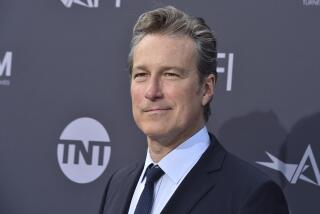The directors: Michael Patrick King and ‘Sex and the City 2’
When Michael Patrick King was first approached about working on the “Sex and the City” series in 1998, he was intrigued by two things: One was the ambiguous look on Sarah Jessica Parker’s face at the end of the pilot, when she appears to morph from insouciance to stoic dismay as her future love Big drives away. The other was the lure of “taking sex out of the shadows. I like the fact that it’s not so dark and shamey. We took sex out of the black, inky oil stain and we made it pink and fuzzy like Champagne.”
It was an exciting new realm for the 55-year-old writer-director of now two “Sex and the City” feature films. “Having been raised Irish Catholic, shame-based and never talking about sex, suddenly, I had this whole world that no writer had had,” says King, the son of a janitor and a Krispy Kreme worker. When he wrote a scene set in a taxi cab with Charlotte complaining about her new lover’s sexual preferences, “and the four girls are talking about anal penetration but comically — I thought, ‘This has never been written before!’ ”
One only has to look at King’s Sunset Boulevard office to recognize the distance he’s traveled. In one glass display case is the famed white tutu skirt worn by Parker in her first season as columnist Carrie Bradshaw. Yet right above that is a black-and-white photograph of a family of Tinkers, poor Irish nomadic folk that “Sarah Jessica gave me as a gift after the first movie, so ‘you never forget where you come from.’ ” Another photo shows Andy Warhol, like King, a son of Pennsylvania who through self-invention, climbed the heights of pop culture. King, a kind of scrappy, clever leprechaun, notes that Warhol came from Pittsburgh rather than his own hometown of Scranton: “He’s a little more steel. I’m more coal.”
Parker notes that even after all these years of working with King on the character, the two still get dazzled by some of Carrie’s forays into excessive luxury. “He always thinks we respond that way because we’re from working-class people,” says the actress. “This minute-to-minute appreciation of anything grand and spectacular. He relishes the opportunity because, growing up where he did, it was a big deal to pursue what he wanted. For him to be in the driver’s seat is probably beyond all of his own dreams.”
Remembering his roots has in a way been the key to writing the fantastical, glamorous world of Carrie and company, four single women of a certain age looking for love in Manhattan. “The thing you can’t let go of is gravity. The reality of gravity in writing. If someone says something really mean in a sitcom, and the next wave isn’t a reaction to the reality of that, you start losing relatability,” he says. “In a lot of romantic comedies, they throw out the rules of life.”
In “Sex and the City 2,” King and company don’t skirt from the basic reality, which is that our heroines are now deep into their 40s. “It’s important they continue to move forward in this movie or else it will be false,” says King, noting that the 32-year-old versions of these characters still play every night on TV. “There’s nothing to be done,” Parker agrees, with a laugh. The series “is too far gone to try to pretend the years don’t exist and, clearly, I’m not willing to change visually what there is” (i.e. her face).
This said, unlike the first film in 2008, which dealt with Carrie’s fiancé Big jilting her at the altar, and was really about “sitting in the dark and crying with her,” King says, the second one is more of an extravagant comic romp. “I wanted to do something that justifies them getting dressed up again and wanted the party to continue,” which it does — in Abu Dhabi.
If, at first blush, it sounds totally nutty to send Carrie, Samantha, Charlotte and Miranda to the Middle East, the conceit does have some mad comic genius to it. Given the current economic climate, it would seem outré to have the heroines still luxuriating in the same Manhattan hotspots, their privileged lives untouched by the recession. Instead, they’re in Abu Dhabi — which, until the recent debt crisis, was the most ostentatiously wealthy city in the region — tagging along on Samantha’s all-expense-paid junket. The women are like fairy princesses for a week in an over-the-top pleasure palace with personal butlers and cars — for each of them. Yet King and company don’t skirt from the repressive sexual politics of the region. Suffice it to say, Samantha’s in-your-face sexuality gets them all in big trouble.
King traveled to Abu Dhabi and Dubai repeatedly to research and scout, but once the authorities there actually read the script, permission to film suddenly evaporated. They wound up filming in Morocco, where “it’s Muslim light,” says King. “


